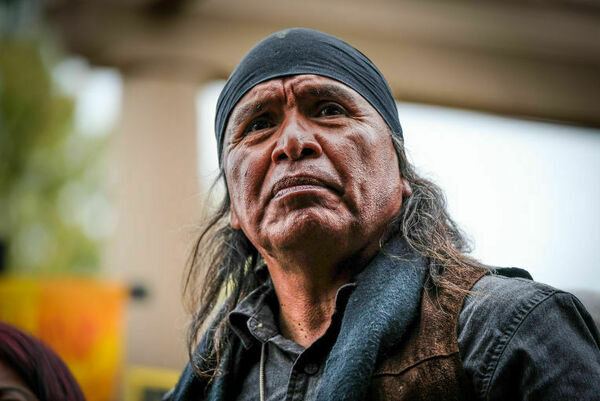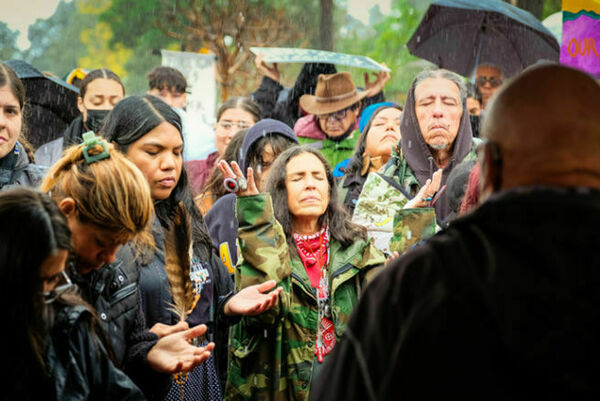Religious Liberty Clinic participates in oral argument to defend Oak Flat
Apache Stronghold v. United States was one of the first cases that the University of Notre Dame Law School Religious Liberty Clinic supported when the clinic was newly established in the 2020-21 academic year. For the past two years, faculty and students from the clinic have stood with members of the Apache tribe to protect Oak Flat, a sacred site in Arizona that is threatened by a massive copper mining operation.
After a divided ruling from the U.S. Court of Appeals for the Ninth Circuit, the legal battle continued this spring when the Ninth Circuit reheard the case “en banc,” meaning in front of a full panel of 11 judges. Less than 1 percent of en banc requests are granted.
Professor Stephanie Barclay, director of the Notre Dame Law School Religious Liberty Initiative, participated in oral argument before the en banc Ninth Circuit on March 21 in Pasadena, California. Barclay represented the National Congress of American Indians, an Apache tribal elder and other groups that protect Native American cultural heritage and rights. The groups were also represented in an amicus brief the Religious Liberty Clinic filed in the Ninth Circuit last fall.
Apache Stronghold v. United States involves a proposed mining project that would destroy sacred land where the Apache have gone for centuries to worship, pray and conduct religious ceremonies. The site is also sacred to various other Native American tribes, including the ancestors of today’s O’odham, Hopi, Zuni, Yavapai and Apache tribes.

Apache Stronghold — a nonprofit community organization dedicated to the defense of Native American sacred sites — has argued that the proposed copper mine at Oak Flat would violate the religious rights of many Apache and other Native Americans. Resolution Copper, a joint venture of British-Australian mining companies BHP and Rio Tinto, plans to construct a copper mine that would turn the sacred site into a massive crater.
In a previous hearing at the Ninth Circuit, a three-judge panel held in a 2-1 ruling that the federal government could proceed with the transfer of Oak Flat to Resolution Copper.
At the en banc rehearing, Barclay provided three arguments in support of Apache Stronghold to a new panel of judges: “First, this court should revisit its troubling rule under Navajo Nation. Second, the land rider did not displace RFRA (Religious Freedom Restoration Act). Third, it is government, rather than private action in this case, that imposes the substantial burden on the religious exercise of the Apache people.”
She argued alongside Luke Goodrich, vice president and senior counsel at Becket Law.
The destruction of Oak Flat would impose a substantial burden on Native American religious exercise, as Native American religious identity, expression and practices are inextricably tied to the sacred land, Barclay told the panel of judges.
Whether they are directly or indirectly affected by government actions, Native American tribes tend to be vulnerable to government violations of their religious liberty.
After the en banc hearing, a diverse coalition of Indigenous activists, environmental groups, religious advocates and legal practitioners convened in front of the courthouse steps, where Barclay delivered remarks.

“I was proud to argue in oral argument on behalf of Notre Dame’s Religious Liberty Clinic today. Notre Dame was proud to argue alongside Becket and our Apache friends in this fight for Oak Flat,” Barclay said.
“Although our religious beliefs are different, we see that what the government is doing is wrong,” she said. “Just as we would hope that people would defend [us] if someone wanted to destroy a sacred shrine or a pilgrimage site for Christian religious groups, so, too, should the government have to justify its actions if it wants to destroy this sacred site of Oak Flat.”
Barclay reiterated her support for Apache Stronghold and saving Oak Flat following the oral argument: “I’m optimistic that, after argument today, the Ninth Circuit will issue a ruling that will make clear that our religious freedom laws apply equally to people of all faith and to all sorts of places of worship whether we’re talking about a synagogue or a mosque or a Native American sacred site.”
Established in 2020, the Notre Dame Law School Religious Liberty Initiative promotes and defends religious freedom for all people through advocacy, formation and thought leadership. The initiative protects the freedom of individuals to hold religious beliefs as well as their right to exercise and express those beliefs and to live according to them.
The Religious Liberty Initiative has represented individuals and organizations from an array of faith traditions to defend the right to religious worship, to preserve sacred lands from destruction, to promote the freedom to select religious ministers and to prevent discrimination against religious schools and families.
Learn more about the Religious Liberty Initiative at religiousliberty.nd.edu.
To read this story in full, visit religiousliberty.nd.edu/news.
Originally published by at religiousliberty.nd.edu on April 28.
Latest Colleges & Schools
- ‘Prebunking’ false election claims may boost trust in electionsIn recent years, democracies worldwide have seen a growing erosion of trust in election outcomes and institutions, driven in part by fears of widespread fraud. New Notre Dame research finds that “prebunking” — providing accurate information before false claims spread — boosts trust in elections more effectively than traditional fact-checking.
- Justice Amy Coney Barrett to deliver Center for Citizenship and Constitutional Government lectureAmy Coney Barrett, associate justice of the Supreme Court of the United States, will speak at the University of Notre Dame at 4 p.m. Sept. 12 in the Leighton Concert Hall of the DeBartolo Performing Arts Center.
- Three Notre Dame researchers win NEH grants for humanities-based projectsDavid Hernandez, the Eli J. and Helen Shaheen Associate Professor of Classics, and Morgan Munsen, senior research and partnerships program manager at the Nanovic Institute for European Studies in the Keough School of Global Affairs, have each won an NEH Collaborative Research grant. Thomas A. Stapleford, associate professor in the Program of Liberal Studies, is leading a team that has been awarded a Humanities Research Center on Artificial Intelligence grant.
- Open-access database offers insights into U.S. congressional candidatesEach election cycle, thousands of candidates vie for seats in the U.S. House of Representatives and the Senate. Until now, there has been no comprehensive, publicly available resource cataloging what those candidates say about who they are or what they stand for. A new open-access database called CampaignView, created by researchers at the University of Notre Dame, offers researchers, journalists and educators a powerful tool to understand congressional elections.
- First impressions count: How babies are talked about during ultrasounds impacts parent perceptions, caregiving relationshipPsychologist Kaylin Hill studied the impact of a parent’s first impression of their baby during an ultrasound exam. The words used by the medical professional to describe the baby (positive or negative) influence how the parents perceive their baby, relate to them after they're born and even how that child behaves as a toddler. The research has broad implications for how we train medical professionals to interact with expectant parents, as well as how we care for parents during the perinatal period when they are most susceptible to depression.
- Prioritizing prenatal care may decrease low birth weight outcomes in The Gambia, Notre Dame research findsA new study co-authored by University of Notre Dame researchers highlights the importance of prenatal care for improving the health of mothers and newborns, providing evidence that can inform policy.













